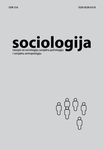Kako građani Vojvodine sagledavaju ekološke probleme: prikaz empirijskog istraživanja
The Way of Perceiving Ecological Problems by Citizens of Vojvodina: Presentation of Empirical Research
Author(s): Ljubinko Pušić, Ana Pajvančić-CizeljSubject(s): Social Sciences
Published by: Sociološko naučno društvo Srbije
Keywords: Vojvodina; ecological problems; globalization; participation
Summary/Abstract: The paper presents selected results of an empirical research about the attitudes of Vojvodinian citizens towards ecological problems. Its starting hypothesis is that the sensibility of citizens’ attitudes towards ecological problems is the crucial key to create participative model of decision-making processes regarding environment. Research goals are descriptive and exploratory: evaluating the general attitude towards ecological problems, and checking their links with socio-demographic characteristics of respondents and with the globalization of the consciousness about the environment. The results of research show that respondents first recognize directly observable ecological problems (pollution). The rest of respondents recognized ecological problems which are necessarily mediated by global ecological consciousness and by ideas that put mainly human beings in the center of ecological issues (the lack of ecological consciousness). The respondents are divided in determining the state/civil society as the possible source of ecological problems, where most of them recognized the state institutions (ecological legislation) as such. The respondents expressed a significant level of non-anthropocentric values towards nature. The assumed link between socio-demographic characteristics and reception of ecological problems was not confirmed. It is shown that the attitude of Vojvodinian citizens towards ecological problems is highly diversified. On one hand, this attitude reflects an ecological consciousness, formed by the direct experience in the local context; while, on the other hand, it reflects a consciousness formed in the framework of globalized environmental discourse in “networked society”.
Journal: Sociologija
- Issue Year: 54/2012
- Issue No: 1
- Page Range: 153-168
- Page Count: 16
- Language: Serbian

